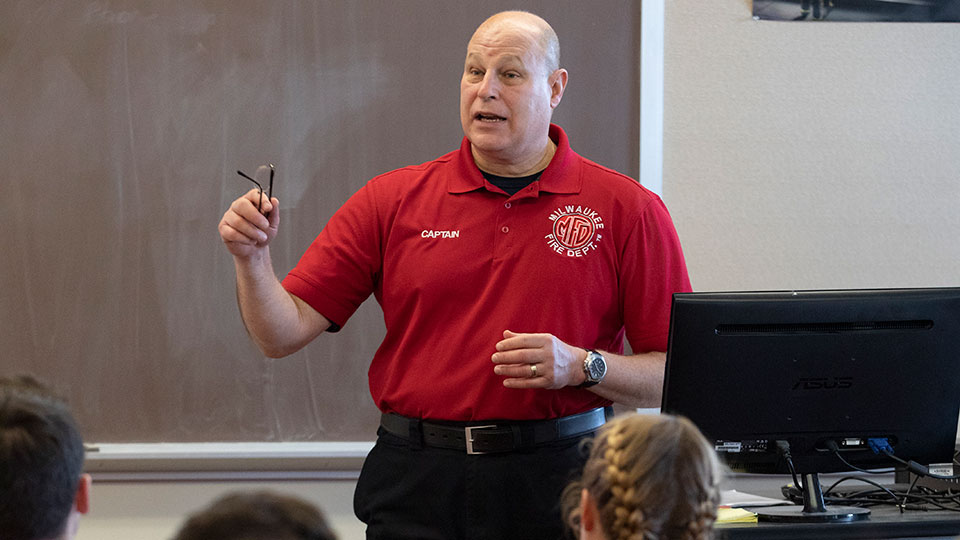
Captain Paulin lectures to a group of cadets.
Professional firefighters are trained as paramedics and are often the first responders to a medical emergency. Thanks to an innovative partnership between MATC and the City of Milwaukee, new recruits are poised to help Spanish-speaking residents get efficient, considerate care during an emergency.
The collaboration started several years ago when Milwaukee Fire Department Deputy Chief Joshua Parish took an MATC Spanish class. He strove to meet the needs of the city’s growing Spanish-speaking population so Captain and Cadet Command Bill Paulin, who retired earlier this year, worked with MATC on a custom course. MATC faculty teach the course at the Milwaukee Safety Academy and it’s now a permanent aspect of the city’s cadet program.
“Every 911 call is an emergency and if we get someplace and the people don’t speak English, it can be the difference between life or death,” said Paulin.
MATC emphasizes real-world, hands-on learning throughout its curriculum and instructor Betsy Cerpich designed a seven-week course specific to paramedic and firefighting situations. “I teach Spanish language commands and phrases that they can use right away to help them assist Spanish-speaking persons. We incorporate cultural competency training to improve patient adherence and compliance,” explained Cerpich.
Cultural competence includes understanding health and wellness from the Hispanic perspective; learning about family traditions, home remedies and alternative healthcare methods, plus an awareness of the different viewpoints of pain.
I teach Spanish language commands and phrases that they can use right away to help [future firefighters] assist Spanish-speaking persons.
Recruits practice situations they may experience in emergencies and use role play techniques. Then they reach out to the community by offering free health screenings at grocery stores and other locations in predominantly Hispanic neighborhoods. The interactions present opportunities to use key Spanish phrases clearly and correctly to describe the procedures’ steps and to obtain pertinent information.
When they are on the job, the recruits never know when their skills will be called upon. “It is exciting to see the Spanish class offered to these cadets because of the diverse population that they cover in the City of Milwaukee,” said MATC Director of Protective Services Russ Spahn.
The recruits receive a college transcript and the four-credit course is transferable to other colleges and universities. MATC also provides anatomy and physiology courses for the cadets. Some recruits have continued their college education and are pursuing a bachelor’s degree.
“MFD recognizes the value in cutting through language barriers – it allows them to provide higher-quality care,” said Cerpich. “It’s a highlight of my teaching at the college. I am just thrilled to go there every summer and be a part of it.”
To learn more about protective services programs, visit matc.edu/course-catalog/ community-human-services.

